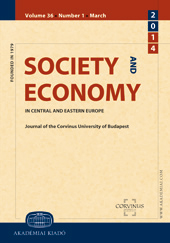Is Discrepancy Between Confidence and Spending Driven by Pessimism or by High Aspriations? Review of the Discrepancy Between the Admitted Financial Situation and Actual Spending in Hungary
Is Discrepancy Between Confidence and Spending Driven by Pessimism or by High Aspriations? Review of the Discrepancy Between the Admitted Financial Situation and Actual Spending in Hungary
Author(s): Csongor HajduSubject(s): National Economy, Behaviorism, Socio-Economic Research
Published by: Akadémiai Kiadó
Keywords: income; spending; savings; confidence; benchmarks;
Summary/Abstract: The opinions of people are expected to forecast their actions, and even major economic institutions rely on this correlation. This research paper examines a case when the opinion of people about their financial situation contradicts their financial-related actions. In 2012 in Hungary the general opinion of people about their financial situation was showing the lowest confidence in the world, with a significant declining trend, reaching an extremely low level. Although the general expectation would be that this pessimism triggers a set-back in consumer spending, figures show that Hungarians were on the other end of the scale regarding their expenditures and were greatly increasing their spending. This raises the question: why do people say they are in such a tough financial situation yet instead of saving they increase their spending? This paper presents a cross-country analysis that reviews the severity of this discrepancy, as well as proves the validity of the question by excluding several alternative explanations, followed by a recommendation and hypotheses for a detailed research to explain the phenomenon.
Journal: Society and Economy. In Central and Eastern Europe ǀ Journal of the Corvinus University of Budapest
- Issue Year: 39/2017
- Issue No: 2
- Page Range: 233-250
- Page Count: 18
- Language: English

